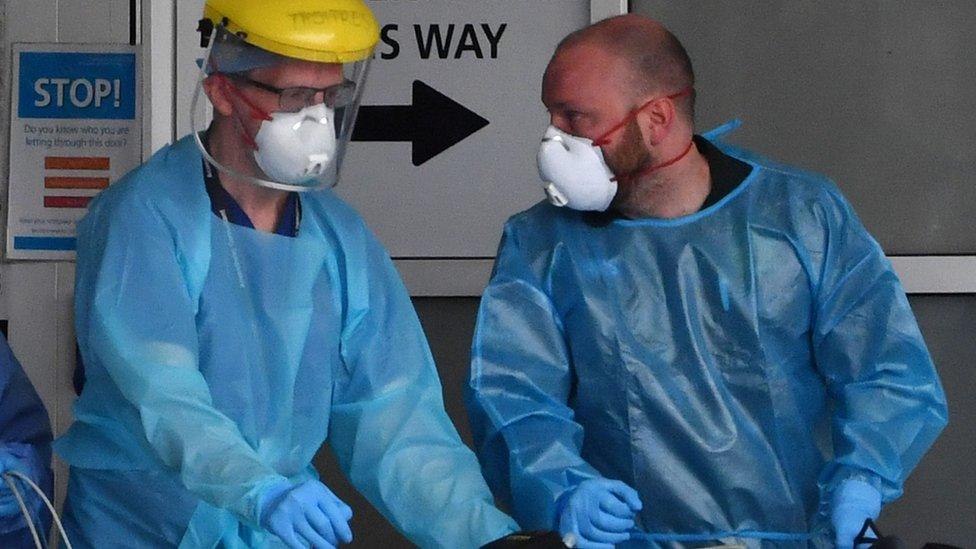Coronavirus: UK failed to stockpile crucial PPE
- Published
- comments
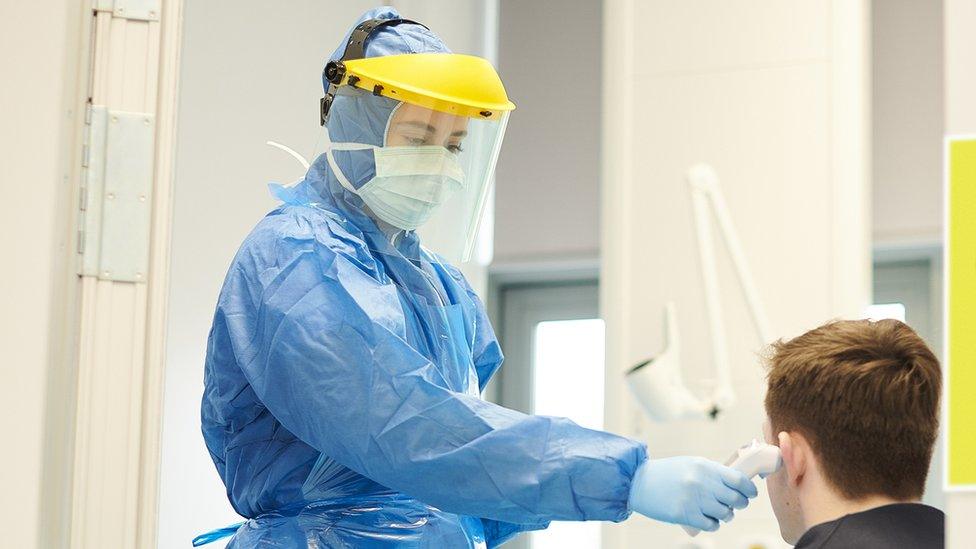
The government failed to buy crucial protective equipment to cope with a pandemic, a BBC investigation has found.
There were no gowns, visors, swabs or body bags in the government's pandemic stockpile when Covid-19 reached the UK.
NHS staff say they are being put at risk because of the shortage of personal protective equipment (PPE).
The government said it has taken the right steps and is doing everything it can to increase stocks.
The investigation by BBC Panorama found that vital items were left out of the stockpile when it was set up in 2009 and that the government subsequently ignored a warning from its own advisers to buy missing equipment.
The expert committee that advises the government on pandemics, the New and Emerging Respiratory Virus Threats Advisory Group (Nervtag), recommended the purchase of gowns last June.
Gowns are currently one of the items in shortest supply in the UK and they are now difficult to source because of the global shortage of PPE.
Doctors and nurses have complained that there are also shortages of the life-saving FFP3 respirator masks.
Panorama has discovered that millions of FFP3 respirator masks are unaccounted for.
There were 33 million on the original 2009 procurement list for the stockpile, but only 12 million have been handed out.
The government refuses to explain where the other masks have gone.
A government spokesperson said there was "limited demand" for the masks coming through the Supply Disruption Line, "which is one reason why they haven't all been distributed".
They added that gowns were a recent recommendation from the advisory group and would be procured for the "future stockpile build up alongside all other necessary equipment".
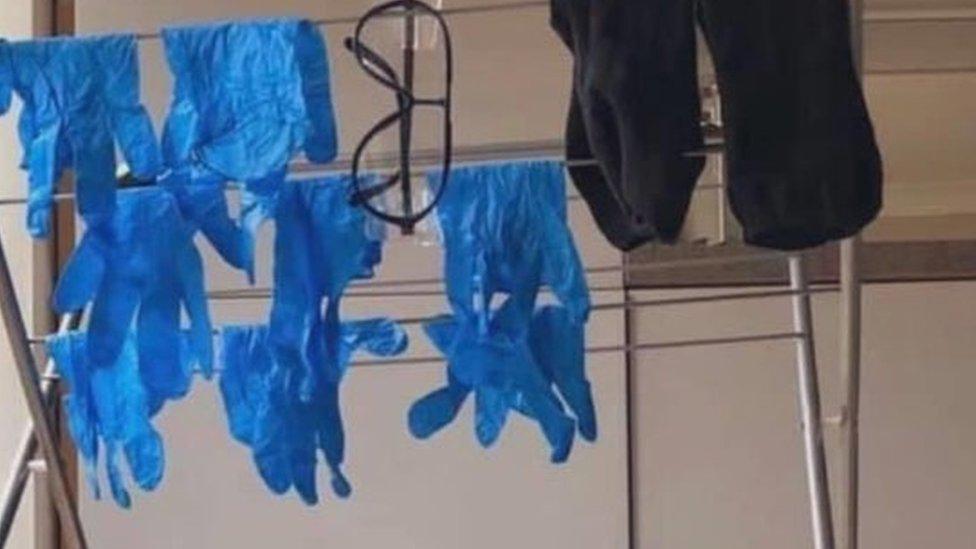
NHS staff have been washing and reusing PPE
Panorama has spoken to a number of NHS insiders about PPE who wish to remain anonymous.
"There is a complete lack of transparency from the government. They are creating panic, as we don't know if they can supply us so we are scrambling to get it elsewhere," a head of procurement told the programme.
The government also failed to stockpile visors, the swabs needed for testing and the body bags needed for the dead.
Professor John Ashton, a public health expert and long-standing critic of the government, told the programme the lack of preparation was breathtaking.
"The consequence of not planning; not ordering kit; not having stockpiles is that we are sending into the front line doctors, nurses, other health workers and social care workers without the equipment to keep them safe," he said.
A government spokesperson said the stockpile was designed for a flu pandemic and that Covid-19 is a different disease with a higher hospitalisation rate.
They said swabs and body bags were not recommended by Nervtag historically, but eye protection was, so the stockpile contains safety glasses.
Government minister Victoria Atkins told BBC Breakfast she was "very, very sorry to hear" of the Panorama report.
"Like every other country in the world, [the virus] is unprecedented and the requirements for PPE have risen exponentially and we are doing our absolute best to address those needs and will continue to do so throughout this crisis," she said.

EASY STEPS: How to keep safe
A SIMPLE GUIDE: What are the symptoms?
CONTAINMENT: What it means to self-isolate
HEALTH MYTHS: The fake advice you should ignore
MAPS AND CHARTS: Visual guide to the outbreak

Panorama also investigated changes to the government guidance on what PPE NHS staff should wear.
In January this year, Covid-19 was officially designated a High Consequence Infectious Disease (HCID). The decision was made in consultation with a group of British experts.
A Health and Safety Executive evaluation of PPE published in 2019 had already recommended that all healthcare workers should wear a gown, FFP3 respirator mask and visor when dealing with HCIDs.
Those recommendations were in line with existing UK guidance.
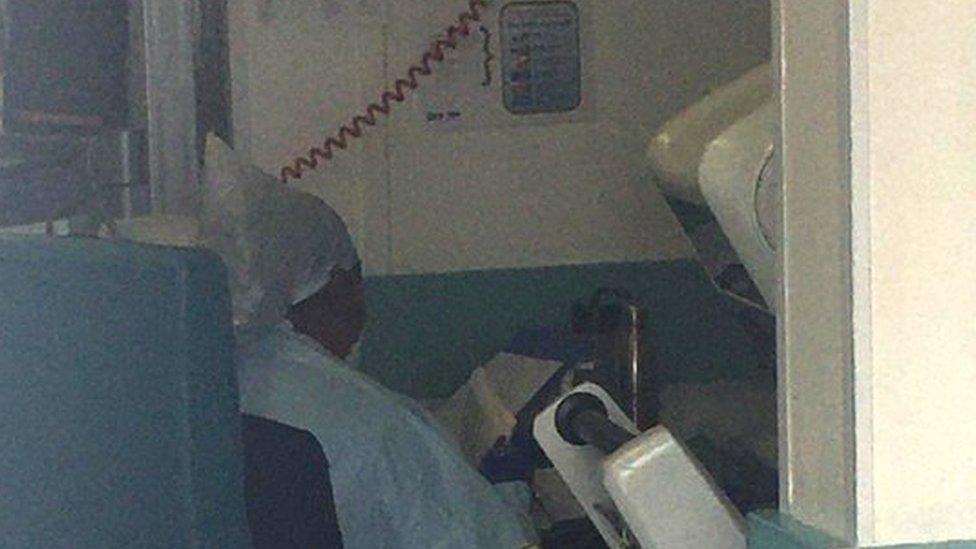
An NHS worker is pictured wearing a plastic bag as a hair cover
But on 13 March this year, the government downgraded its guidance on PPE and told NHS staff they were safe to wear less protective aprons and basic surgical masks in all but the most high risk circumstances.
Panorama understands that on the same day, the government took steps to remove Covid-19 from the list of HCIDs.
But the experts who had recommended the coronavirus be put on the list in the first place were not consulted. Instead, the government asked its Advisory Committee on Dangerous Pathogens (ACDP).
Panorama has discovered that the ACDP was only asked to consider the matter on the morning of its 13 March meeting. It was added to the committee's agenda under "any other business".
The committee backed the decision to remove Covid-19 from the HCID list, but sources on that committee have told Panorama that it had to be, in part, a pragmatic decision based on the availability of PPE.
It was another six days before Public Health England announced that the coronavirus was no longer considered an HCID.


A government spokesperson said Covid-19 was taken off the list because it has a low overall mortality rate and there is now greater clinical awareness and a specific laboratory test for the virus.
They added the committee's advice that Covid-19 no longer be considered an HCID was based entirely on scientific considerations.
"The HCID classification is used for serious infections where there are limited numbers of cases requiring specialist input and facilities," the spokesperson said.
"This is an unprecedented global pandemic and we have taken the right steps at the right time to combat it, guided at all times by the best scientific advice.
"The government has been working day and night to battle against coronavirus, delivering a strategy designed at all times to protect our NHS and save lives."
You can watch the full Panorama programme, Has the Government Failed the NHS? on iPlayer here.
- Published21 April 2020
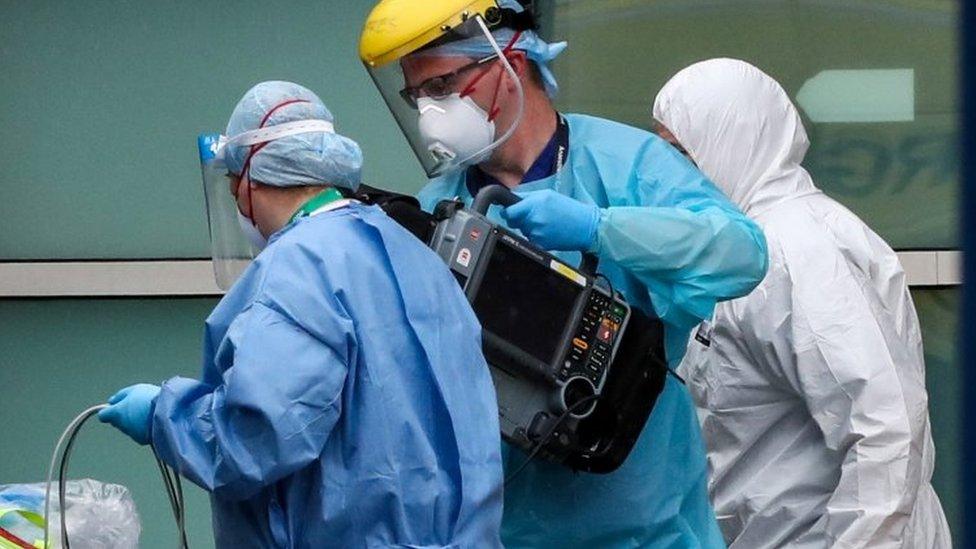
- Published17 April 2020

- Published19 April 2020
